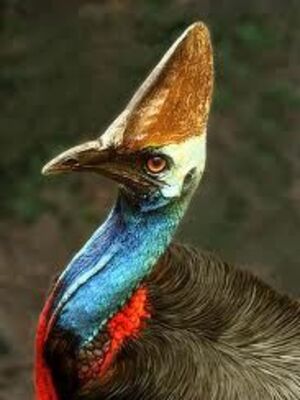
A tonne of fruit helps hungry Cassowaries
Monday 21 February 2011
A tonne of fruit helps hungry Cassowaries

More than one thousands kilograms of fruit has been distributed to feeding stations via aerial drops in the Mission Beach area to provide food for cassowaries affected by Cyclone Yasi.
Climate Change and Sustainability Minister Kate Jones today praised the dedicated work of staff from the Department of Environment and Resource Management, conservation groups, research partners and tireless volunteers who have helped in the delivery of these emergency food supplies.
"Twenty-one feeding stations have now been set up between Mission Beach, Tully, Cardwell, Tully Heads, Etty Bay and Mt Mackay," Ms Jones said.
"These fruit-filled feeding stations are now providing important supplementary food for the Cassowaries, which had much of their habitat and food supplies destroyed when the cyclone tore through the area.
Hundreds of kilograms of fruit, including melons, pawpaw, bananas, peaches, apples, tomatoes, lychee have also be dropped from helicopters into less accessible locations.
"This has been a remarkable effort by our rangers who have coordinated the emergency response plan; by local conservation groups and volunteers who have helped cut up fruit and clear forest paths; and by north Queensland retailers who have donated fruit not fit for sale.
"I'd like to thank everyone involved for their remarkable efforts - in many cases our rangers and volunteers have themselves been impacted by the cyclones so this is an incredible response."
Ms Jones said the feeding program is supplementary only, and not intended to replace natural feeding patterns as food supplies regenerate.
"Static feeding stations are being moved and alternated to encourage natural foraging, and prevent habits forming," she said.
"Field crews are monitoring key sites and bird behaviour to guide response actions such as new feed stations, signage and advice to neighbours, and to place warning signs for motorists.
Members of the public are reminded not to feed cassowaries for their own safety and in the interests of the birds' long-term survival.
Ms Jones also urged people to keep an eye out for the birds on roads, and drive slowly in areas where you are likely to encounter a cassowary.
"Finally, it is essential that dogs are restrained in cassowary country. A lot of fences have been damaged, so dogs may be roaming and dog attacks could pose a significant threat to cassowaries," Ms Jones said.
The Cassowary Response Team continues to work with local government, conservation groups and locals to manage the ongoing recovery program.
Sightings should be reported to DERM on 1300 130 372 or email to cassowary.sighting@derm.qld.gov.au.